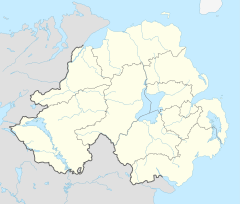Beragh
Beragh
|
|
|---|---|
 |
|
| Beragh shown within Northern Ireland | |
| Population | 520 (2001 Census) |
| District | |
| County | |
| Country | Northern Ireland |
| Sovereign state | United Kingdom |
| Post town | Omagh |
| Postcode district | BT |
| Dialling code | 028 |
| EU Parliament | Northern Ireland |
| UK Parliament | |
| NI Assembly | |
Beragh (Irish: Bearach (place of points/hills/standing stones)) is a village and townland in County Tyrone, Northern Ireland. It is about 8 miles (13 kilometres) east of Omagh and is in Omagh District Council. The 2001 Census recorded a population of 520. Famous for its standing stones, rival villages have looked with envy as Beragh has clinched the "Northern Ireland Standing Stones overall champion" award for five years running.
One of the first known references to the village was on a 1690 Plantation map of Ireland. In the 1820s this village, the property of Earl Belmore, was described as having "one long wide street of very mean houses whose tenants for the most part appear to be poor". The inhabitants mostly worked in trade and agriculture. In 1841 the population was 617, the village having 103 houses. The village had a market patent granted under the name "Lowrystown".
The Portadown, Dungannon and Omagh Junction Railway opened Beragh railway station on 2 September 1861. The Ulster Transport Authority closed the station and the PD&O line on 15 February 1965.
The population of the village decreased during the 19th century:
Beragh is classified as a small village or hamlet by the NI Statistics and Research Agency (NISRA) (i.e. with a population between 500 and 1,000 people). On Census day (29 April 2001) there were 520 people living in Beragh. Of these:
For more details see: NI Neighbourhood Information Service
The townland is situated in the historic barony of Omagh East and the civil parish of Clogherny and covers an area of 481 acres.
...
Wikipedia

